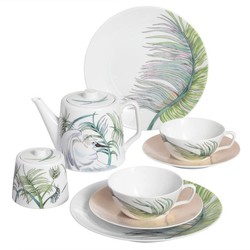Porcelain care
CARE AND HANDLING OF PORCELAIN
WE RECOMMEND WASHING PORCELAIN BY HAND.
Avoid harsh scourers or abrasive pads. Even in water, the glazed surfaces can be scratched if rubbed against each other. So avoid putting too many items into the water at any one time.
Gold or Platinum trimmed porcelain are to be handled with extra care and should never be put into microwave oven as the electro-magnetic reaction will damage the precious metal permanently.
In hard water areas, deposits may form on your tableware if the water is left to dry. These soluble deposits can easily be removed with a diluted acid such as vinegar.
ABOUT THE USE OF DISHWASHER
Porcelain may be washed in a dishwasher with extra care. Here are some useful tips.
Use hot water (less than 65°C) and less detergent.
Load the porcelain correctly onto the rack ensuring the individual items are not touching the other pieces. This could cause breakage during the washing cycle. Avoid overloading.
The high heat used for drying the porcelain will soften the gold and platinum lines. Only handle the porcelain after it is cooled down to room temperature.
STORAGE OF PORCELAIN
To avoid scratching the porcelain, avoid sliding the pieces over each other. Protective pads or towels (including paper-towel) are helpful in avoiding scratching.
Some Porcelain is marked as MICROWAVE-SAFE, DETERGENT AND DISHWASHER SAFE.
Most of the stoneware and earthenware are good for everyday use. However, certain precautions should be taken:
Never expose to direct heat from the naked flame, gas stove or electric ring.
Dishwasher washing is safe, however avoid detergents containing abrasives and load pieces correctly so that they will not hit with each other.
Marked dinnerware is safe in freezers. Care should be taken when re-heating frozen food. Avoid sudden change of temperature (eg taking from the freezer and straight into a hot oven) as it will cause thermal-shock which damages the porcelain.


